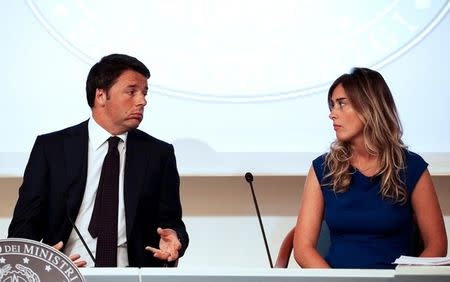Italy PM Renzi says 'mistake' to personalise constitutional referendum

ROME (Reuters) - Italian Prime Minister Matteo Renzi said on Tuesday it had been a mistake to personalise a referendum, due to be held later this year, in which he originally promised to resign if he failed to convince voters to support the need for constitutional change. Political uncertainty linked to the vote on proposals Renzi says will bring stability after 70 years of revolving-door government has added to concerns about fragility in the euro zone's third-largest economy. "I made a mistake personalising it too much," Renzi told party supporters at an event in Modena, northern Italy. "This is not one person's reform, this is the reform Italy needs." No government has completed a full term in Italy since World War Two, making it difficult to reform an economy whose debt is second in the euro zone only to Greece's as a proportion of output, which has itself has sputtered for decades. Renzi wants to do away with a parliamentary system in which the upper and lower houses have equal powers, effectively abolishing the Senate as an elected chamber and sharply reducing its ability to veto legislation. The Senate has the ability to bring down governments by withdrawing its confidence and advocates of the reform say the proposed changes will stabilise government and speed up lawmaking. Opponents fear the removal of democratic checks and balances and over-centralisation of power. Polls have shown the "Yes" and "No" camps almost neck-and-neck, and many voters undecided ahead of the day of reckoning, which will likely fall between October and December this year. Credit ratings agency DBRS cited uncertainty around the referendum when it placed Italy under review last week, raising the prospect of higher funding costs for banks already strangled by 360 billion euros ($400 billion)of bad loans. ($1 = 0.8998 euros) (Reporting by Isla Binnie; Editing by Richard Balmforth)

